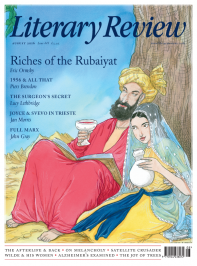Lucy Moore
Halved Lives
The Radium Girls
By Kate Moore
Simon & Schuster 465pp £16.99
When fourteen-year-old Katherine Schaub started work at the watch-dial factory of the Radium Luminous Material Corporation in Newark, New Jersey, in February 1917, she thought she was the luckiest girl in the world. Her new job, applying the numbers to watch dials in luminous paint, would be hard work, requiring diligence and a steady hand, but it promised to pay well and the other girls were welcoming and would become friends. More than that, though, there was the glamour of working with radium: the so-called ‘watch studio’ looked as if it had been sprinkled with stardust.
Discovered by Marie and Pierre Curie only nineteen years earlier, radium was a wonder element. At $120,000 a gram it was the most valuable substance on earth and had been hailed as a miracle cure that could wither cancerous tumours and restore vitality to the old. Even its name made it sound as if those in contact with it would actually become radiant. ‘Sometimes I am halfway persuaded that I can feel the sparkles inside my anatomy,’ claimed one happy user with unconscious insight.
At the studio, tiny particles of radium used in the luminous paint made everything gleam. The girls were covered with a fine layer of dust that infiltrated their clothes and clung to their hair and skin and particularly their lips, since they repeatedly wet the tips of their slender brushes

Sign Up to our newsletter
Receive free articles, highlights from the archive, news, details of prizes, and much more.@Lit_Review
Follow Literary Review on Twitter
Twitter Feed
Under its longest-serving editor, Graydon Carter, Vanity Fair was that rare thing – a New York society magazine that published serious journalism.
@PeterPeteryork looks at what Carter got right.
Peter York - Deluxe Editions
Peter York: Deluxe Editions - When the Going Was Good: An Editor’s Adventures During the Last Golden Age of Magazines by Graydon Carter
literaryreview.co.uk
Henry James returned to America in 1904 with three objectives: to see his brother William, to deliver a series of lectures on Balzac, and to gather material for a pair of books about modern America.
Peter Rose follows James out west.
Peter Rose - The Restless Analyst
Peter Rose: The Restless Analyst - Henry James Comes Home: Rediscovering America in the Gilded Age by Peter Brooks...
literaryreview.co.uk
Vladimir Putin served his apprenticeship in the KGB toward the end of the Cold War, a period during which Western societies were infiltrated by so-called 'illegals'.
Piers Brendon examines how the culture of Soviet spycraft shaped his thinking.
Piers Brendon - Tinker, Tailor, Sleeper, Troll
Piers Brendon: Tinker, Tailor, Sleeper, Troll - The Illegals: Russia’s Most Audacious Spies and the Plot to Infiltrate the West by Shaun Walker
literaryreview.co.uk